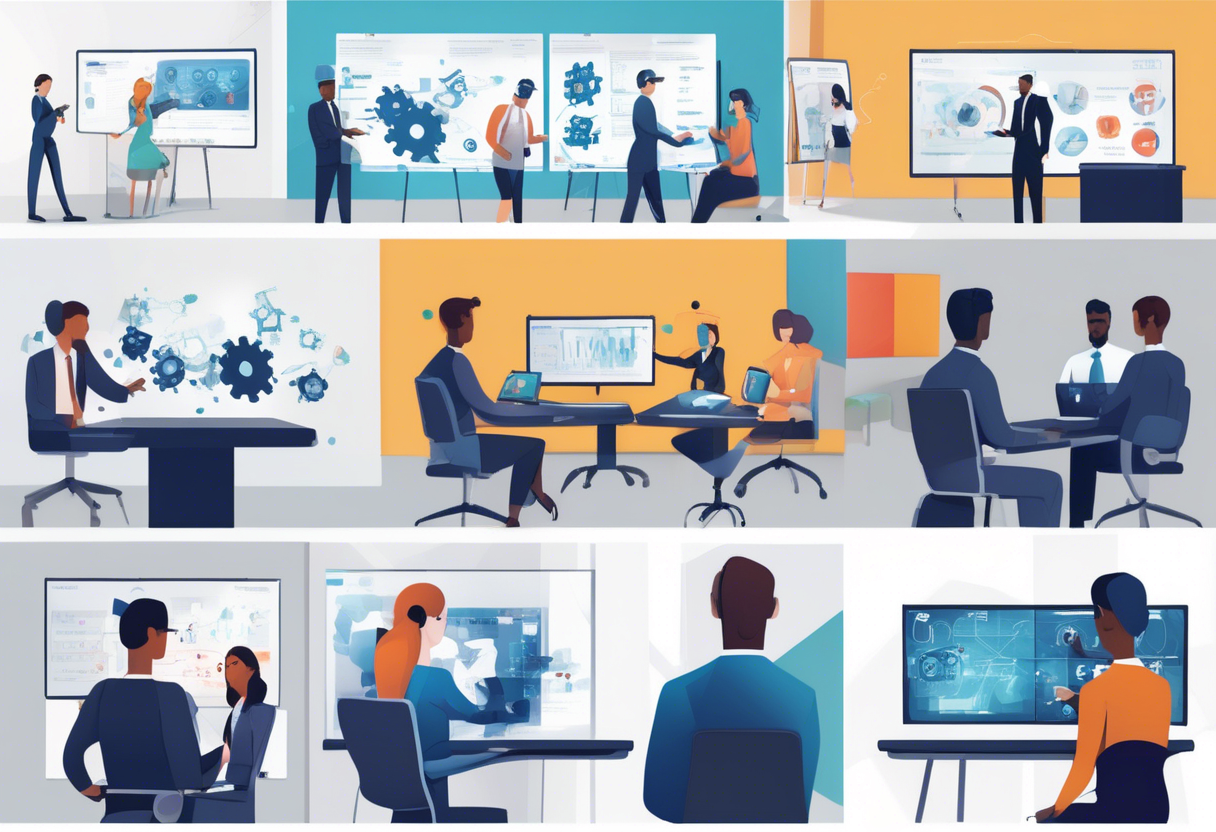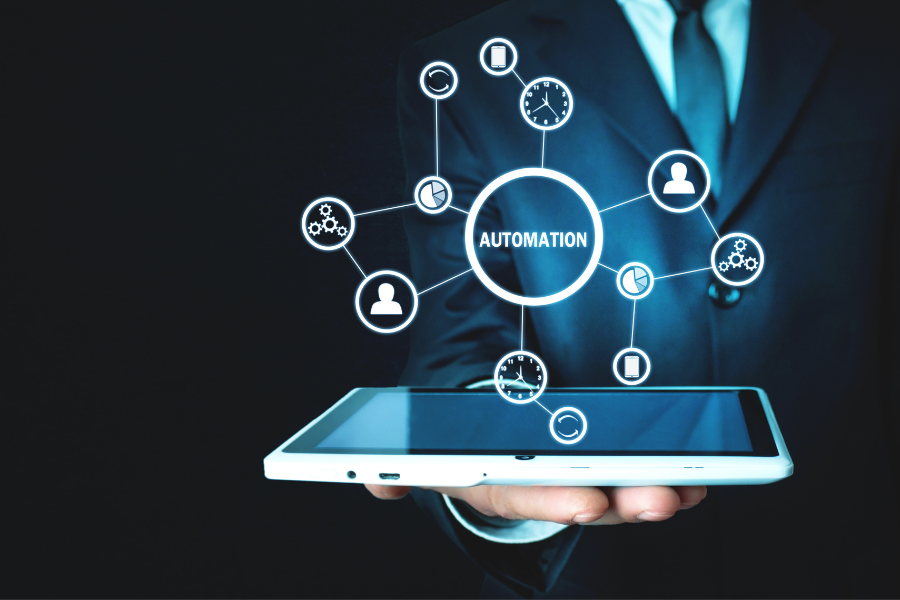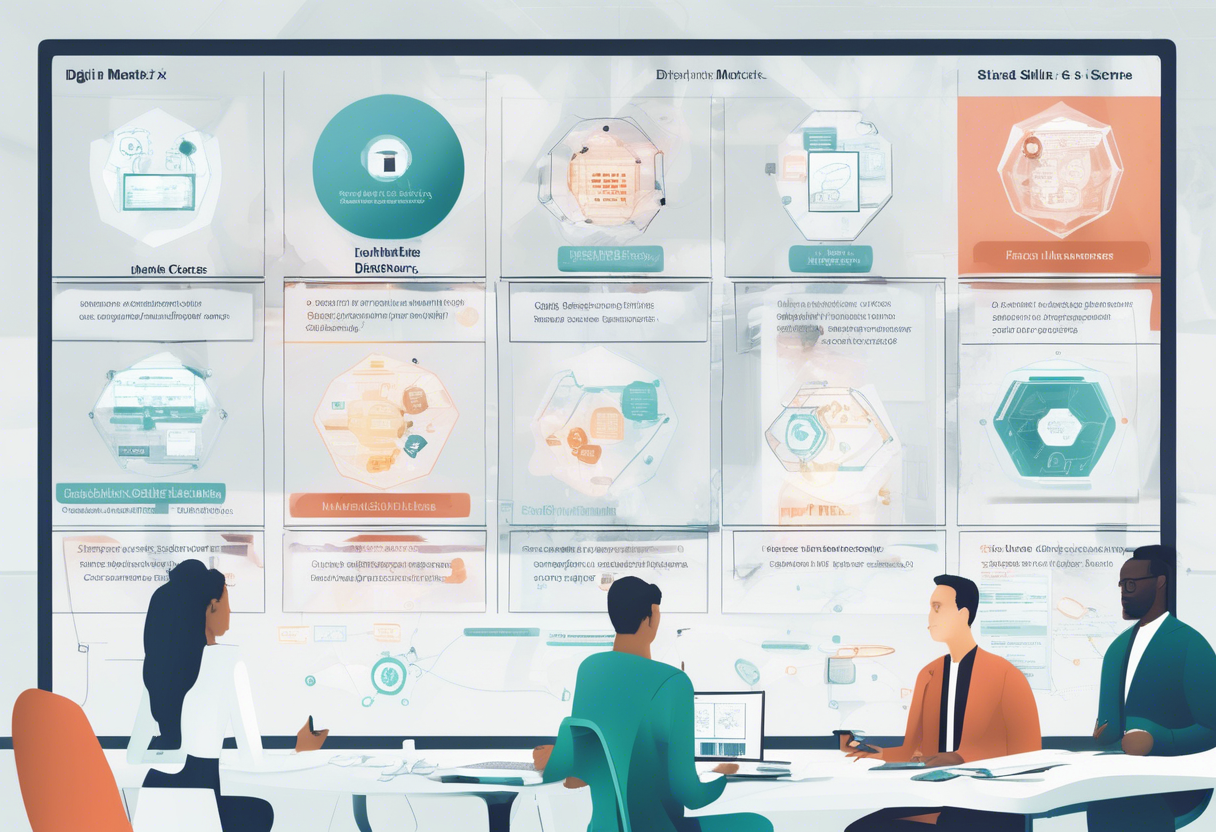
In business today, keeping up isn't just a goal—it's essential. AI in corporate training is making a real difference. Companies using AI have seen a 30% boost in employee engagement and performance. This isn't just a passing trend; it's changing how we think about professional growth. Imagine a training setup where learning paths adjust on the fly to fit each person's needs and style. We'll look at how AI is improving learning and helping create a more flexible workforce. If you're a business leader, HR pro, or just curious about workplace learning, this article will offer insights into how AI is changing corporate training. Let's get started!
Summary: This article discusses the role of AI in corporate training, highlighting its practical benefits, tools, technologies, challenges, and future outlook. It also addresses frequently asked questions about implementing AI in corporate training environments.
The Role of AI in Corporate Training
Key Functions of AI in Corporate Training
AI is revolutionizing corporate training by personalizing the learning experience. By analyzing various data sources, AI customizes content to align with each employee's goals, facilitating skill development. For instance, AI platforms assess current employee skills and learning preferences, then craft personalized modules with engaging, game-like assessments. This tailored approach can enhance employee engagement by up to 20% and improve retention by 15%, as reported by organizations utilizing AI, such as Deloitte.
AI further enriches training with interactive tests and games, making the learning process more immersive. Additionally, chatbots and virtual assistants provide real-time support, ensuring continuous learning. A prime example of this is IBM's Watson Assistant, which offers on-the-spot assistance.
Moreover, AI delves into employee performance and learning patterns through people analytics, aiding HR in making informed decisions. It also automates routine administrative tasks, allowing HR professionals to focus on strategic initiatives. AI-driven simulations and virtual reality are also noteworthy, as they create hands-on environments for skill practice. Companies like Strivr are leveraging VR to elevate training to new heights.
Practical Benefits of AI in Corporate Training
AI-Enhanced Learning Outcomes
AI is transforming corporate training by customizing learning paths to align with each employee's unique needs and preferences. This personalized approach ensures that employees receive training that's precisely tailored to them. With AI, learning becomes more engaging and effective, as it selects content that truly captures attention.
- Interactive Assessments and Games: These elements keep learners interested and motivated, significantly aiding in the retention of information.
- Detailed Insights: AI provides comprehensive insights into individual performance, empowering managers to make informed decisions about employee development.
- Continuous Learning: By offering access to personalized resources on demand, AI helps employees stay current with the latest knowledge.

For example, a company might leverage AI to identify skill gaps and deliver training that adapts in real-time, enhancing skill levels and job performance.
AI-Driven Cost and Time Efficiency
AI significantly reduces the cost and time associated with corporate training. It automates administrative tasks such as scheduling and progress tracking, allowing trainers to concentrate on more critical aspects.
- Cost Reduction: Automation lowers expenses linked to traditional training methods.
- Accelerated Learning: AI-driven training accelerates skill development, enabling employees to spend less time in training.

By precisely targeting training, companies can save money and minimize wasted time. For instance, an organization might use AI to automate scheduling and optimize content delivery, reducing training costs by 30% and cutting training time in half.
Boosting Employee Engagement with AI
AI plays a crucial role in enhancing employee engagement in training programs. Through gamification and interactive assessments, learning becomes enjoyable and engaging.
- Personalized Learning Paths: These ensure training is relevant, leading to increased job satisfaction.
- Instant Feedback: AI tools provide immediate feedback, fostering a responsive and positive learning environment.
Employees have the flexibility to access materials anytime, promoting continuous learning and reducing disengagement. AI adapts to various learning styles, making training more inclusive. A company might use AI to design gamified sessions tailored to individual preferences, resulting in a 40% increase in course completion and improved overall engagement.
Organizations implementing AI in training report a 20% boost in employee engagement and a 15% increase in training effectiveness, according to Deloitte. AI enhances engagement by offering real-time support, personalized feedback, and interactive experiences. It streamlines onboarding with customized learning paths for new hires, facilitating quicker integration. Adaptive learning systems monitor performance, adjust paths, and provide instant feedback, making training more engaging. Generative AI scales personalized learning by tailoring content to each employee's role and skills, ensuring relevant training. Additionally, AI reduces managers' workload by automating tasks such as progress tracking, allowing them to focus more on feedback and development. AI-driven training enhances skills, productivity, and competitiveness through workshops, online courses, and programs tailored to company needs.
AI Tools and Technologies in Corporate Training
AI-Driven Tools for Enhanced Learning
Artificial intelligence is transforming corporate training by offering tools that make learning more personal, efficient, and scalable. With AI, training is tailored to individual learning styles, progress, and preferences. This personalization not only enhances effectiveness but also increases engagement, aligning learning experiences with the specific needs of each learner.
AI-Powered Automation and Analytics in Training
AI eases the burden of administrative tasks in training, allowing trainers and HR professionals to focus on strategic objectives. AI analytics monitor employee performance, providing real-time insights to refine training programs. These tools can:
- Connect learning outcomes to business goals.
- Predict skill gaps.
- Direct learning efforts where they are most needed.

AI-Generated Content and Virtual Coaching Solutions
AI can produce training content such as videos, chatbots, and virtual coaching, reducing the need for costly in-person sessions—a significant advantage for global companies. AI-driven VR and AR simulations create immersive learning environments, particularly beneficial for technical skills. Additionally, virtual mentors adapt to individual learning styles, offering instant feedback and facilitating faster skill acquisition through customized, on-the-spot support.
Advanced AI Learning Management Systems
AI-enhanced Learning Management Systems (LMS) now leverage machine learning and large language models to:
- Accelerate content creation.
- Offer adaptive learning modules.
- Provide chatbot tutors to improve learning outcomes.
Tools like Coursebox integrate course creation with LMS features, offering AI video generation, quizzes, chatbot trainers, and rapid assessments to streamline content development.

AI Studios by Deepbrain AI for Corporate Training
While specific information on AI Studios by Deepbrain AI for corporate training is unavailable, AI platforms typically create realistic virtual spaces for immersive learning. These platforms often incorporate virtual reality to provide hands-on training in a safe environment, enabling employees to practice complex tasks without real-world risks. This approach is especially beneficial in fields where practical experience is crucial.
For more insights, explore AI-driven corporate training and AI learning platforms, as they continuously evolve, offering new opportunities for businesses to enhance their training programs.
Challenges and Considerations in Implementing AI in Corporate Training
Ensuring Data Privacy and Security in AI
Implementing AI in corporate training involves handling substantial amounts of employee data, raising significant privacy and security concerns. Companies must adhere to stringent regulations such as the GDPR in Europe and the CCPA in the U.S. These regulations mandate robust data protection measures to prevent breaches and misuse of sensitive information. Non-compliance can result in legal repercussions and tarnish a company’s reputation.
To mitigate these risks, it is crucial for companies to establish secure data practices and maintain transparency about data usage. This approach helps in building trust in AI-driven training solutions. Collaborating with compliance teams is essential to ensure that AI training programs align with regulatory requirements and safeguard data. By doing so, companies can protect employee information and foster a trustworthy AI training environment.

Addressing Algorithm Bias and Promoting Inclusivity
AI systems in corporate training can inadvertently perpetuate existing biases, potentially leading to inequitable learning opportunities. To maintain fairness, it is vital to monitor and address biases within AI systems. HR teams should evaluate these systems for transparency and reliability, ensuring ethical use of AI in employee development.
Key strategies include:
- Utilizing diverse training data.
- Regularly auditing AI algorithms for biases.
- Designing AI to accommodate various learning styles and needs.
Focusing on inclusivity helps ensure that AI training programs are equitable and accessible to all employees, promoting a more inclusive workplace culture.
AI in corporate training is pivotal for the future, with leaders anticipating that 40% of their workforce will require new skills due to AI and automation within the next three years. This highlights the importance of addressing these challenges to fully leverage AI in training.
Future Outlook: AI's Evolving Role in Corporate Training
AI Trends and Predictions in Corporate Training
By 2025, AI-driven corporate training is expected to revolutionize the way we learn. It will introduce:
- Personalized Experiences: Tailoring learning paths to individual needs.
- Automated Content Creation: Streamlining the development of educational materials.
- Real-Time Insights: Providing instant feedback and progress tracking.
These advancements mean that individuals can learn more efficiently and close skill gaps more rapidly. For instance, AI-powered personal coaching and virtual mentors are accessible 24/7, adapting to unique schedules and learning styles. This flexibility accelerates reskilling and supports continuous development.
Skills-Based Training aims to bridge skill gaps by aligning employee growth with business needs, fostering upskilling and knowledge sharing among peers.

When AI is combined with immersive technologies like VR and AR, it transforms hands-on and technical training into more engaging experiences through realistic simulations.
AI is transitioning from experimental phases to serious implementation, supported by robust policies and structures. This evolution marks a mature phase focused on measurable outcomes and scalability.

Early adopters, such as IBM and Walmart, have already experienced significant improvements in employee engagement and customer satisfaction due to AI-driven training.
FAQ Section
How Does AI Enhance Employee Engagement in Corporate Training?
AI significantly enhances employee engagement in corporate training through adaptive learning systems. These systems analyze individual performance and engagement levels to tailor learning paths that align with each employee's style, preferences, and career goals. This personalized approach makes training more engaging and motivating.
Moreover, AI incorporates gamification and interactive assessments to make learning enjoyable and maintain employee interest. For instance, AI-driven platforms that integrate gamified assessments and virtual reality (VR) simulations ensure that employees remain engaged and motivated throughout their training.
Additionally, AI-powered virtual reality (VR) and augmented reality (AR) platforms create immersive environments. These allow employees to practice skills in real-life scenarios, making learning more hands-on and engaging. Such experiences not only captivate employees but also help them apply their knowledge in real-world situations.
Furthermore, AI tools like chatbots and virtual assistants provide real-time support and feedback, enhancing the interactivity and user-friendliness of learning. According to Deloitte, companies utilizing AI-powered learning experience a 20% increase in employee engagement and a 15% improvement in knowledge retention.
Challenges of Implementing AI in Corporate Training
Implementing AI in corporate training presents several challenges. A primary concern is data privacy, ensuring that employee data is used ethically during personalized learning. Companies must navigate these issues while integrating AI tools into existing learning management systems (LMS) and aligning them with business goals. This often involves overcoming technical hurdles and ensuring compatibility with legacy systems.
Another challenge is training HR and Learning and Development (L&D) professionals to use AI technology effectively. They need to transition from administrative tasks to strategic planning and relationship-building. Addressing these challenges is crucial for the successful adoption of AI in corporate training.
Additionally, companies need to alleviate employee concerns about job security by positioning AI as a partner, not a replacement. Promoting a culture of continuous learning and clearly communicating the benefits of AI-enhanced training is essential.
How AI Personalizes Learning Pathways in Corporate Training
AI personalizes learning by analyzing data on employee performance, skills, job requirements, and learning preferences. This enables AI to create learning paths that dynamically adjust content difficulty, format, and pacing, ensuring training is tailored to each individual.
AI sifts through vast amounts of information from various sources to find content that aligns with user interests and developmental needs. AI-driven training also identifies skill gaps and devises customized reskilling strategies, enhancing learning efficiency and productivity.
Platforms such as Coursera and LinkedIn Learning utilize adaptive learning technology to adjust content based on learner performance and preferences. AI also supports microlearning, delivering small content chunks that fit into an employee's schedule and learning speed, reinforcing knowledge over time.

Ultimately, AI's ability to create personalized learning experiences ensures employees receive the most relevant and effective training, leading to improved performance and job satisfaction. A McKinsey survey found that 70% of companies using AI in at least one area reported a 20% or more increase in employee productivity, with AI automating routine tasks in corporate training as a significant factor.